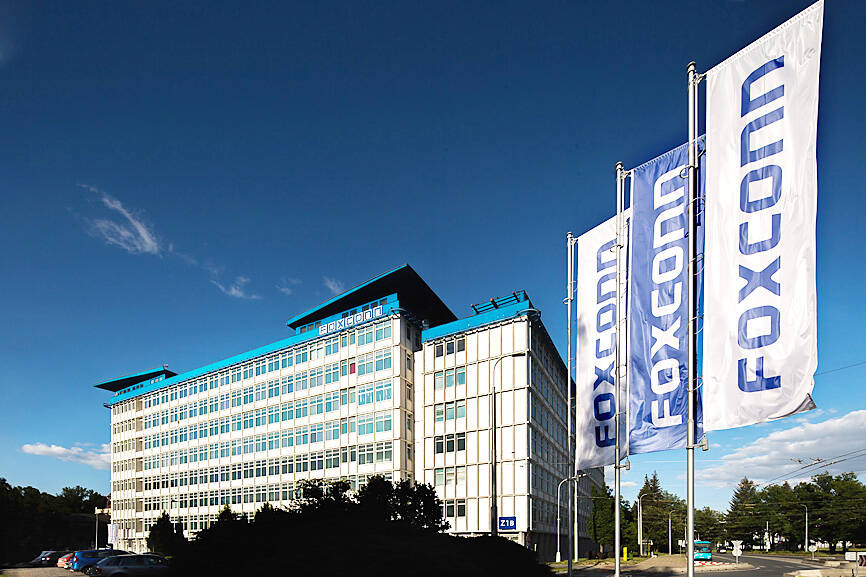Hon Hai Precision Industry Co (鴻海精密) has increased its investments in the Czech Republic and China by more than NT$6 billion (US$196 million) as part of its global expansion.
The company, known as Foxconn Technology Group (富士康科技集團) internationally, has also begun shipping electric pickup trucks produced for US brand Lordstown Motors Corp.
In a Taiwan Stock Exchange filing on Friday, Hon Hai said it has raised investments in its Czech subsidiary Foxteq CZ by US$58.98 million through its PCE Paragon Solutions Kft unit.

Photo courtesy of Hon Hai Precision Industry Co
In the Czech Republic, Hon Hai has a research-and-development center and a product design center, and it assembles monitors, cellphones, wireless communication devices and cloud servers.
The iPhone assembler has also invested 1 billion yuan (US$142.4 million) in a subsidiary in Taiyuan, China, which produces electronic components, mobile communications devices and cell phones.
The latest fund injection increases Hon Hai’s investment in the Taiyuan subsidiary to 1.5 billion yuan, the company said.
Hon Hai has in the past few years boosted its efforts to develop electric vehicles (EVs) as it seeks to broaden its product portfolio and boost its profit margin.
Lordstown last week announced that shipments of its Endurance electric pickup trucks made by Hon Hai on a contract manufacturing basis had started.
Lordstown said Hon Hai would ship the first batch of 500 trucks direct to customers after the model has received the needed certificates from the US Environmental Protection Agency and the California Air Resources Board.
Hon Hai makes the trucks at a factory in Ohio that the manufacturer acquired earlier this year from the US company for US$230 million. The plant is Hon Hai’s first EV manufacturing hub in the US. It is equipped to produce 500,000 to 600,000 vehicles per year.
In addition to the pickups, Hon Hai is planning to produce electric agriculture tractors at the plant from the first quarter of next year, after it in August signed a deal with US-based Monarch Tractor to produce next-generation electric equipment, including battery packs.
To strengthen its EV presence in the US, Hon Hai last month announced that it would increase its stake in Lordstown through a private placement.
It seeks to buy class A common shares of the company for US$70 million and series A preferred shares for US$100 million, Hon Hai said.
After the completion of the transaction, Hon Hai is expected to hold all of Lordstown’s outstanding preferred stock and 18.3 percent of its common stock, and would have the right to appoint two members of the company’s board of directors.
Through the equity investments, cooperation with Lordstown would run deeper than ever, Hon Hai said.
The US firm is expected to increase outsourcing orders to the manufacturer.
Lordstown, which began producing vehicles on a small scale in September and has over the past two years faced lawsuits from investors accusing it of fraud, is expected to join the Mobility in Harmony EV open platform led by Hon Hai.

US sports leagues rushed to get in on the multi-billion US dollar bonanza of legalized betting, but the arrest of an National Basketball Association (NBA) coach and player in two sprawling US federal investigations show the potential cost of partnering with the gambling industry. Portland Trail Blazers coach Chauncey Billups, a former Detroit Pistons star and an NBA Hall of Famer, was arrested for his alleged role in rigged illegal poker games that prosecutors say were tied to Mafia crime families. Miami Heat guard Terry Rozier was charged with manipulating his play for the benefit of bettors and former NBA player and

The DBS Foundation yesterday announced the launch of two flagship programs, “Silver Motion” and “Happier Caregiver, Healthier Seniors,” in partnership with CCILU Ltd, Hondao Senior Citizens’ Welfare Foundation and the Garden of Hope Foundation to help Taiwan face the challenges of a rapidly aging population. The foundation said it would invest S$4.91 million (US$3.8 million) over three years to foster inclusion and resilience in an aging society. “Aging may bring challenges, but it also brings opportunities. With many Asian markets rapidly becoming super-aged, the DBS Foundation is working with a regional ecosystem of like-minded partners across the private, public and people sectors

BREAKTHROUGH TECH: Powertech expects its fan-out PLP system to become mainstream, saying it can offer three-times greater production throughput Chip packaging service provider Powertech Technology Inc (力成科技) plans to more than double its capital expenditures next year to more than NT$40 billion (US$1.31 billion) as demand for its new panel-level packaging (PLP) technology, primarily used in chips for artificial intelligence (AI) applications, has greatly exceeded what it can supply. A significant portion of the budget, about US$1 billion, would be earmarked for fan-out PLP technology, Powertech told investors yesterday. Its heavy investment in fan-out PLP technology over the past 10 years is expected to bear fruit in 2027 after the technology enters volume production, it said, adding that the tech would

YEAR-END BOOST: The holiday shopping season in the US and Europe, combined with rising demand for AI applications, is expected to drive exports to a new high, the NDC said Taiwan’s business climate monitor improved last month, transitioning from steady growth for the first time in five months, as robust global demand for artificial intelligence (AI) products and new iPhone shipments boosted exports and corporate sales, the National Development Council (NDC) said yesterday. The council uses a five-color system to measure the nation’s economic state, with “green” indicating steady growth, “red” suggesting a boom and “blue” reflecting a recession. “Yellow-red” and “yellow-blue” suggest a transition to a stronger or weaker condition. The total score of the monitor’s composite index rose to 35 points from a revised 31 in August, ending a four-month